List of English words of Sanskrit origin – Part 7 of Part 7 | English words originated (derived) from Sanskrit | List of English words taken from Sanskrit | List of English corrupted words taken from Sanskrit
Namaste friends, how are you doing today? Welcome to #BhagavanBhakthi website / blog.
Bhagavan Lord Sri Krishna (Vishnu) (Rama) blessings to you and your family!
In this website / blog, you will always learn about #Hinduism #Sanskrit language.
Also subscribe to my YouTube channel from this link #BhagavanBhakthi to view videos about #Hinduism #Sanskrit language.
Just before going to “List of English words of Sanskrit origin – Part 7 of Part 7 | English words originated (derived) from Sanskrit | List of English words taken from Sanskrit | List of English corrupted words taken from Sanskrit“, let us know a brief, basic and very important information.
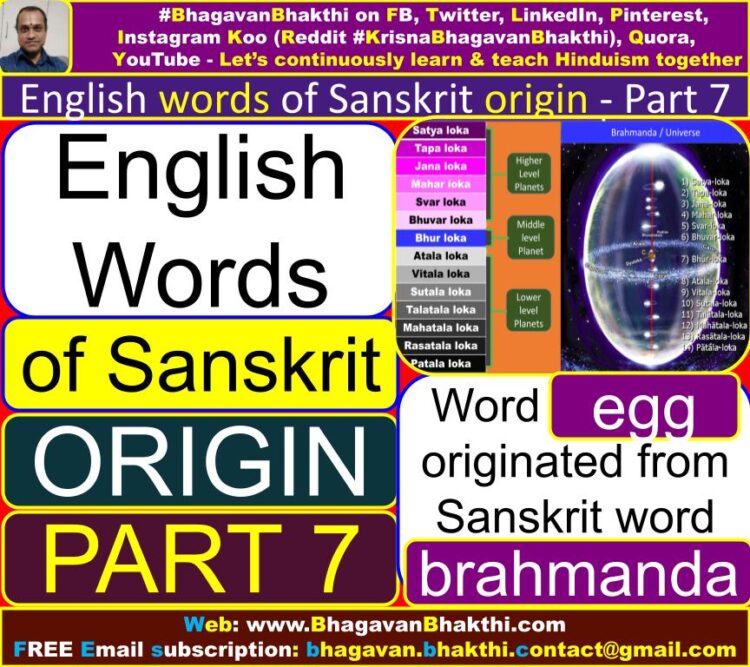
In post your will know about these : List of English words of Sanskrit origin, List of English words derived from Sanskrit, List of English words taken from Sanskrit, List of English corrupted words taken from Sanskrit, etc.
List of English words of Sanskrit origin (Part 7 of Part 7) are as given below:
Oval / Egg : Many of us may know that the whole earth or universe is oval / egg shaped. This explanation was given by Europeans some approximately 2000 years back. But we Indians know it since ages. Our universe is called ‘brahmAnDa‘ (read as brahmaanDa) in Sanskrit.
Here brahmAnDa means ‘the universe which is oval / egg shaped’. brahmAnDa = brahma + anDa. Brahma means universe and ‘anDa’ means oval / egg shaped. NOW WE KNOW THAT REALITY.
Massage = In Sanskrit massage is called as ‘mardanam karoti’. President : In Sanskrit president means ‘pradhAnam / pradhAna’. Another mispronounced word from Sanskrit.
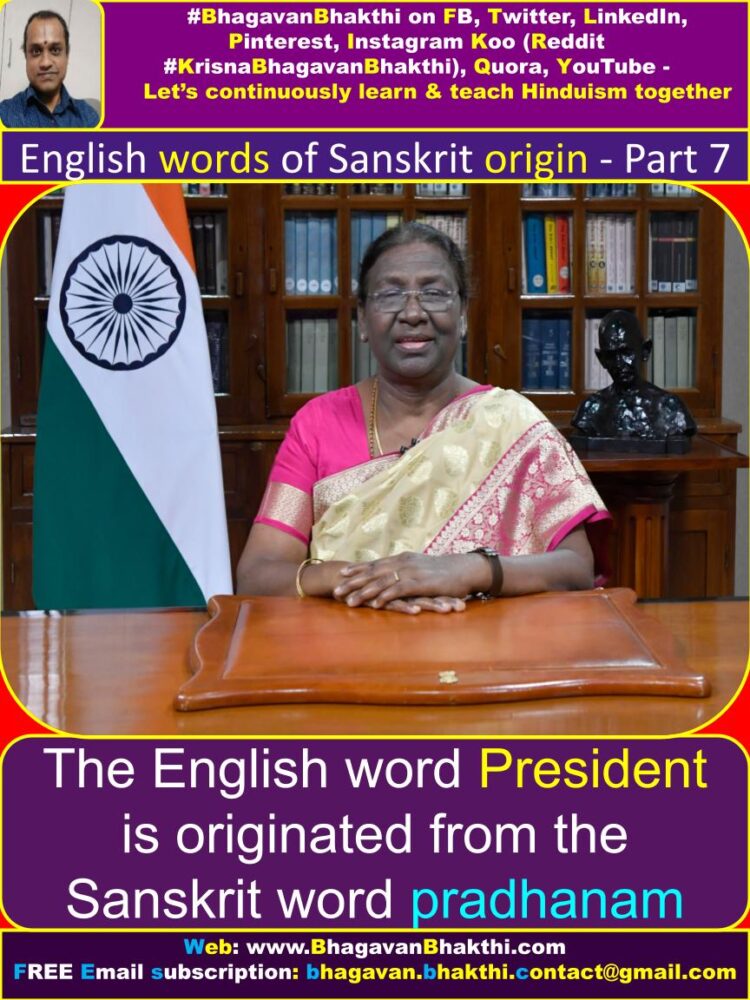
Malign : In Sanskrit malign means ‘mAlinya‘. Another directly copied word from the great Sanskrit language. Technology : In Sanskrit technology means ‘tantragnana‘. Another mispronounced word from the Sanskrit language.
Ardent : In Sanskrit, ardent means ‘adayam / adaya / aday’. Another tongue twister word from our great Sanskrit language. Bear / Birth : In Sanskrit bear / birth means ‘bibharte / bhri’. Very clearly the English words are corrupted versions of the Sanskrit words.
Sucrose : In Sanskrit sucrose or sugar means ‘sharkara / sakkara’ means sucrose or sugar. Another copied word. Tension = In Sanskrit tension means ‘tandava‘ (ताण्डव).
Hole : In many Indian languages we use the word called ‘honDa / honD (होण्ड)’ to describe the water which is stored in a big hole, especially near temples. This shows the English word hole is mispronounced word from the Sanskrit language word honda (होण्ड).
Theist : In Sanskrit theist means ‘Astika / Astik’ (आस्तिक) (read as aastika / aastik). Very clearly the English word is a mispronounced form of the original Sanskrit word. Astika = As + Tika = Tika = Theist.
Atheist : In Sanskrit atheist means ‘ ‘nAstika / nAstik’ (नास्तिक). Again clearly the English word is just a mispronounced word from the original Sanskrit word. naastika = naas + tika = A + tika = A + theist = Atheist.
Needy : In Sanskrit needy means ‘nirdhana / nirdhan’. Another copied word from our great Sanskrit language. Hut : In Sanskrit hut means ‘kuTira‘. Also in Kannada, hut means ‘huTTi’. Clearly taken from Sanskrit language.
Same : In Sanskrit, same means ‘sAmya‘ (read as saamya). A copied word from the Sanskrit word sAmya.
Lost : In Sanskrit lost means ‘lUpta‘ (read as luupta / loopta). Another copied / mispronounced word. Soft : In Sanskrit soft means ‘soumya‘. The English word is the short form of the great Sanskrit language word.
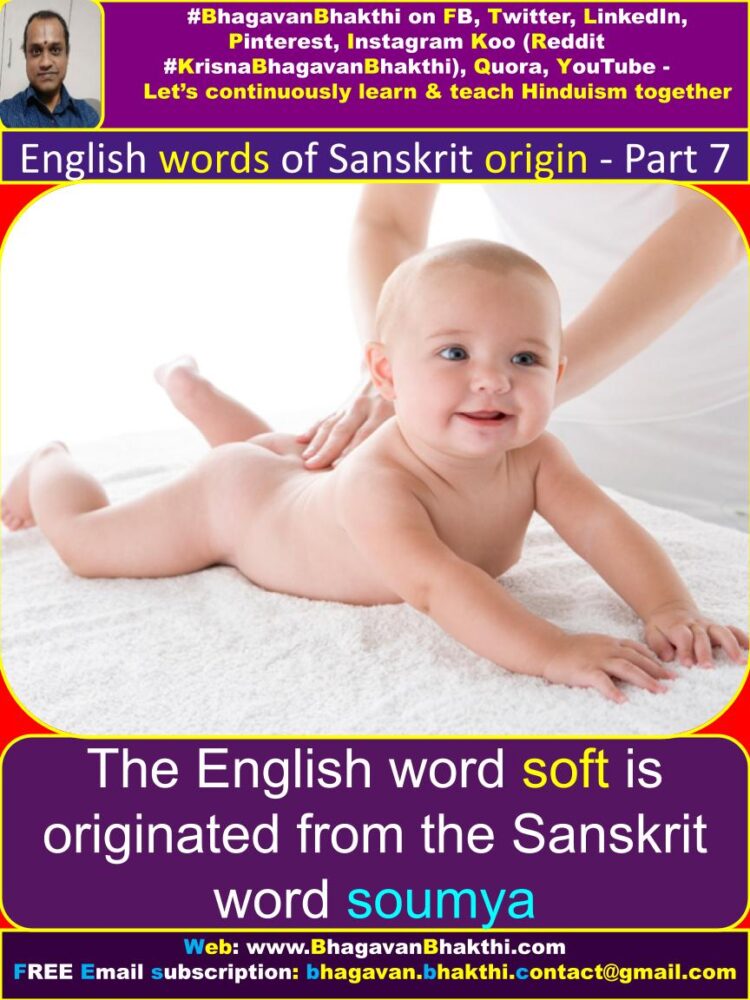
Pale : In Sanskrit pale means ‘pelava / pelav’. Another short form of the great Sanskrit word. Save : In Sanskrit save means ‘shekaraNa / shekaraN’ (read as shekaranha / shekaranh). Short form word from the Sanskrit word.
Arrogant : In Sanskrit, arrogant means ‘Agraham / Agraha’ (read as aagraham / aagraha). Another mispronounced word. Stamp : In means stamp means ‘chApam / chApa / chAp’. chaap = stamp. Only difference is the pronunciation problem by the Europeans.
Cushion : In Sanskrit cushion has the word ‘kusha‘. Another directly copied word from the great Sanskrit language. Tryptophan : This means a chemical when consumed makes our body satisfied. In Sanskrit, satisfaction means ‘trupti‘ (tripti). Very clearly the chemical word is taken from the great Sanskrit word trupti (tripti).
Surrogate : In Sanskrit surrogate means ‘sankarshanam‘. Many of us know, the devata / demigod Sri Balarama was born in the surrogacy way. That is, he was transferred from Mata Devaki to Mata Rohini. For this reason, Lord Sri Balarama is also called as Lord Sri Sankarshana. That’s the secret of this word.
Tornado : When Lord Sri Krishna was still a baby, a demon named ‘trinavarta‘ / ‘truNAvarta‘ (read as trunhaavarta) tries to attack and kill Lord Sri Krishna. This demon comes in the form of a tornado. Very clearly the English word is taken from the great Sanskrit word ‘trinavarta’ / ‘truNAvarta’.
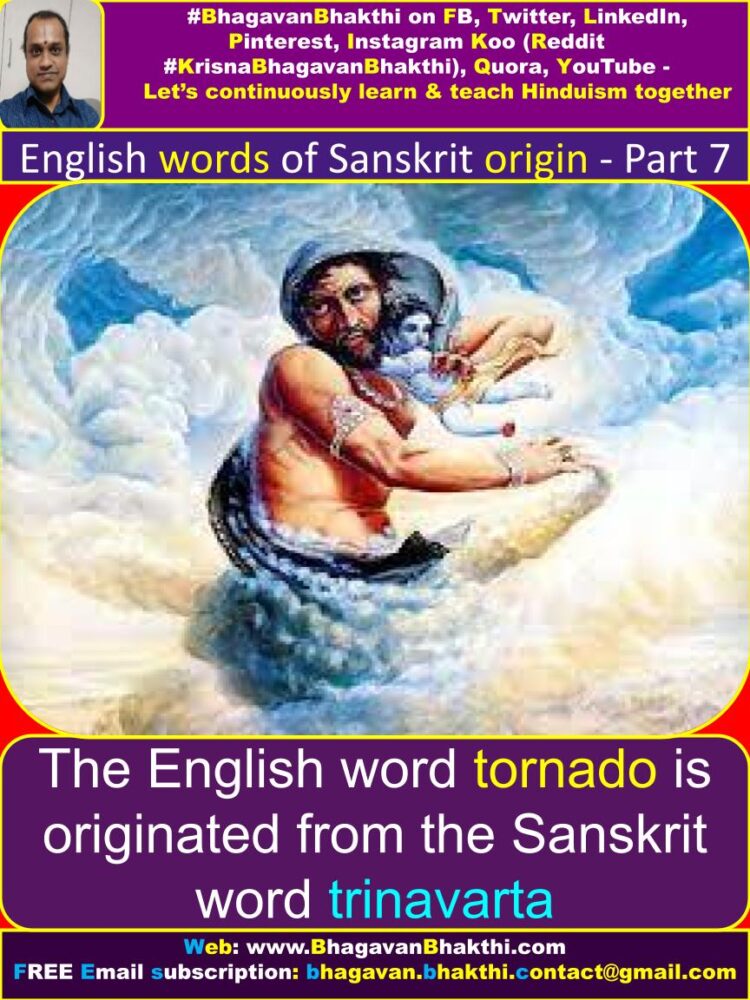
Piece : This is directly taken from our Sanskrit word called ‘puDi‘ (read as pudi / puDi). Pant : The English words Pant is directly taken from the Sanskrit word ‘prothati‘ (प्रोथति). Shirt : This word is directly taken from the word ‘Sharayee / Sharaai / Sharai’, which has same meaning that of the shirt.
Neighbour / Neighbor : This is copied from the Sanskrit word ‘nahuSa‘ (नाहुष) (read as naahusha). Also in many Indian languages the word like Nereyavaru (in Kannada) means neighbour. No doubt that his word is taken from Sanskrit.
Class : In Sanskrit, there is a beautiful word called ‘kaksha‘, which means a place where students do the studies. Very clearly the English word is nothing but a mispronounced word from our great Sanskrit language.
Devotional : Many of us know the meaning of this word is something which is related to God. In Sanskrit, deva / dev means God or Demigods. Thus the English word is nothing but an interpreted word from the great Sanskrit language.
Part : In Sanskrit there a word called ‘pATa‘ (read as paaTa), which means a part or a piece of some big thing. It may be a cloth for an example. Again another copied word. Irritate : In many Indian languages we have word call ‘kirikiri‘ which means to irritate.
Cousin : Many of us know that in Mahabharatha ‘kauravas‘ were cousins of ‘pandavas’. It can be clearly interpreted that the English word cousin has been taken from the great Sanskrit word Kaurava / kavrav.
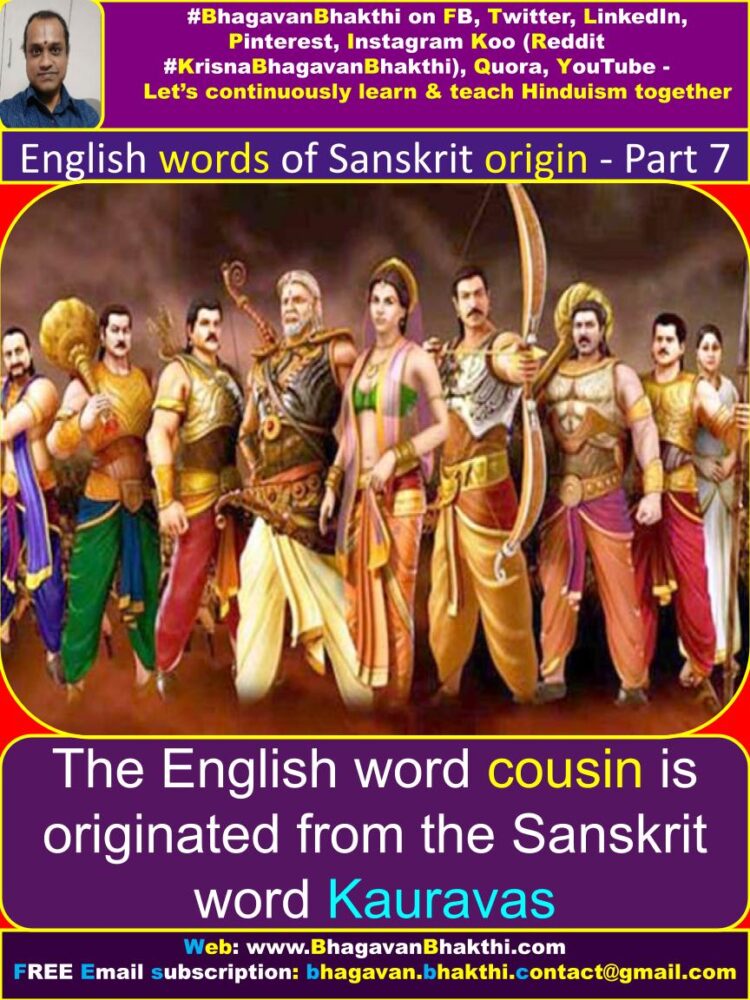
Pollution : In Sanskrit we have a very beautiful word ‘pradushanam‘ which means pollution. Another copied word.
Management : Many of us may know the meaning of this word. This means a group of some senior or very knowledgeable people who take the decision. In Sanskrit, we have a word called ‘mantrimandalam / mantrimandala’ which has the same meaning.
Death / Dead : This is directly taken from the Sanskrit word ‘Dehantam / Dehanta (देहान्त) / Dehant’. Treachery : The Sanskrit word for this word is Dvaitaseva / Dvaitseva. Fart : pardam or parda is the Sanskrit word for fart.
Lad : Ladka is the Indian word for lad. Lady : Ladki is the Indian word for lady. Style : Shaili is the Sanskrit word for style. Caribbean : Caribbean is a place (like West Indies) where black people live. In Sanskrit and many Indian languages Kaali / Kari means black.
Jar : It’s a vessel or tool to car water or something related to it. In Sanskrit Jaari means the same. Both has same meaning. Prompt : In Sanskrit prompt means Pramaanikam or Pramaanika or Prammanik. Very clearly the English word is copied version of the Sanskrit language.
Mongoose : In many Indian languages including Kannada, we use the word called Mungusi for the English word. AM : This means Anti meridian. The Sanskrit word for this is Arohanam maartaandasya.
PM : This means Pre meridian. The Sanskrit word for this is Pathanam maartaandasya. Provoke : The English word provoke is taken from the Sanskrit word Prachodanam.
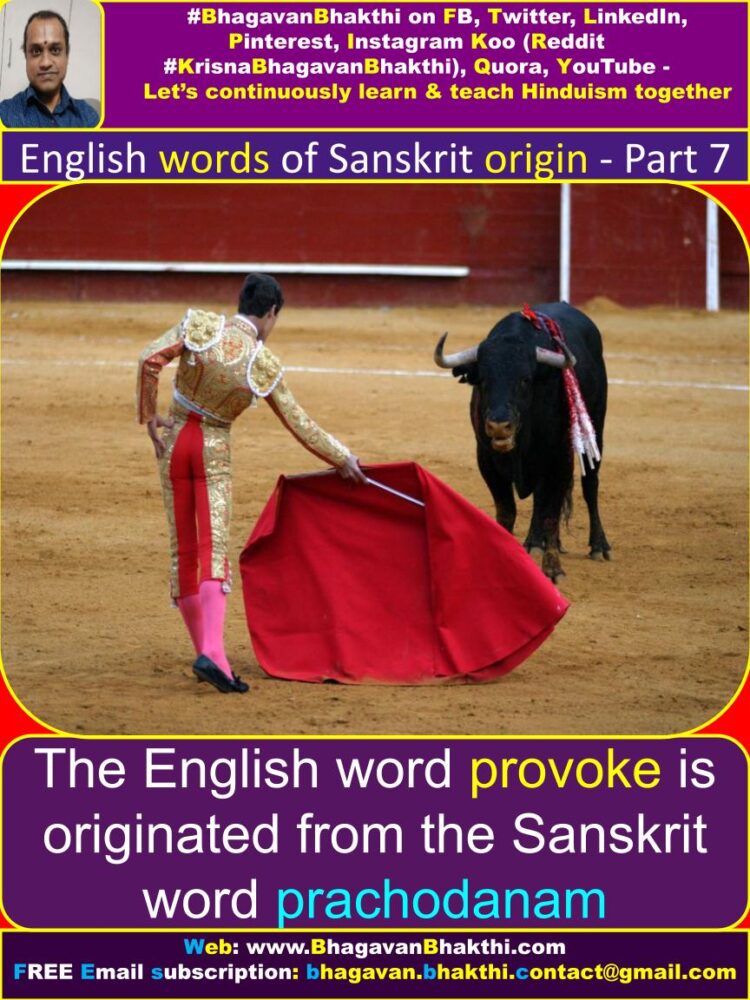
Rescue : This English word came from the Sanskrit word called raksha. Document : The English word document is mispronounced word from dashtaveja / dashtavej. We have another word for this called as daakhala.
Hug : The English word hug is the short form of the Sanskrit word ‘Aalingam / Aalinga / Aaling’ East : In Sanskrit east means Eeshana / Ishana. Continent : In Sanskrit continent means Khandha. Dim : The Indian word for this is dheema.
Ostrich : The Sanskrit word for Ostrich is Ustrapakshi. Sin : Many may be knowing the story of Trishanku. In Trishanku, shanku means sin. Jealous : The Indian word for this is jalanam / jalan.
Cupboard : The Sanskrit for this is ‘kapaatika‘. Generation : The Sanskrit for this is janaangam / janaanga. Sesame : The Sanskrit word for sesame is shimshapa. Sesame is also called as ’tila / til’ in Sanskrit.
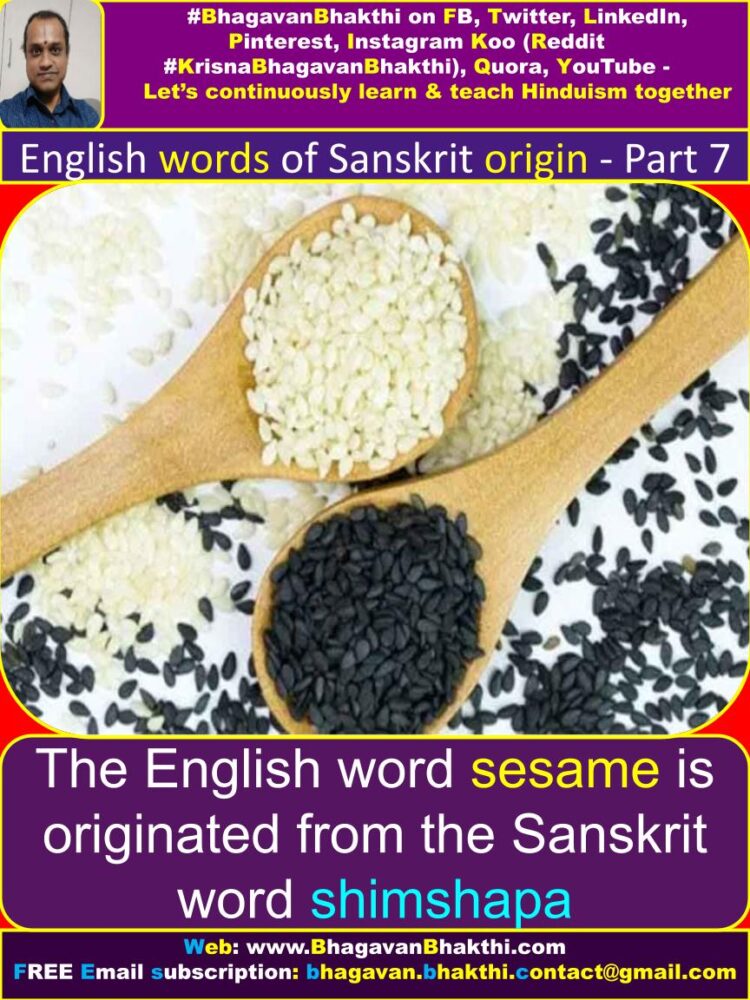
Never : This English word is usually used as prefix in many Sanskrit words like ‘nirvikaara‘. This is the one of the unlimited names of Lord Sri Vishnu. The meaning of the Sanskrit word is “someone who never ever can have any type deformity”. Here the prefix is nothing ‘nir’ is the origin of the English word ‘never’.
Lazy : English word is directly taken from the Sanskrit word ‘aalasya‘. The English word has become a very short word compared to the Sanskrit word as usual. The Europeans always want to make things small. We have seen this several times earlier.
Shut-up = This also taken directly from the Sanskrit word ‘shaantam‘, but a little bit mispronounced. Teacher : English word ‘teacher’ is a mispronounced word from the Sanskrit word “aacharya“.
We need to give concentration on the second half of the Sanskrit word, that aacharya = aa + charya. Here the charya has become teacher.
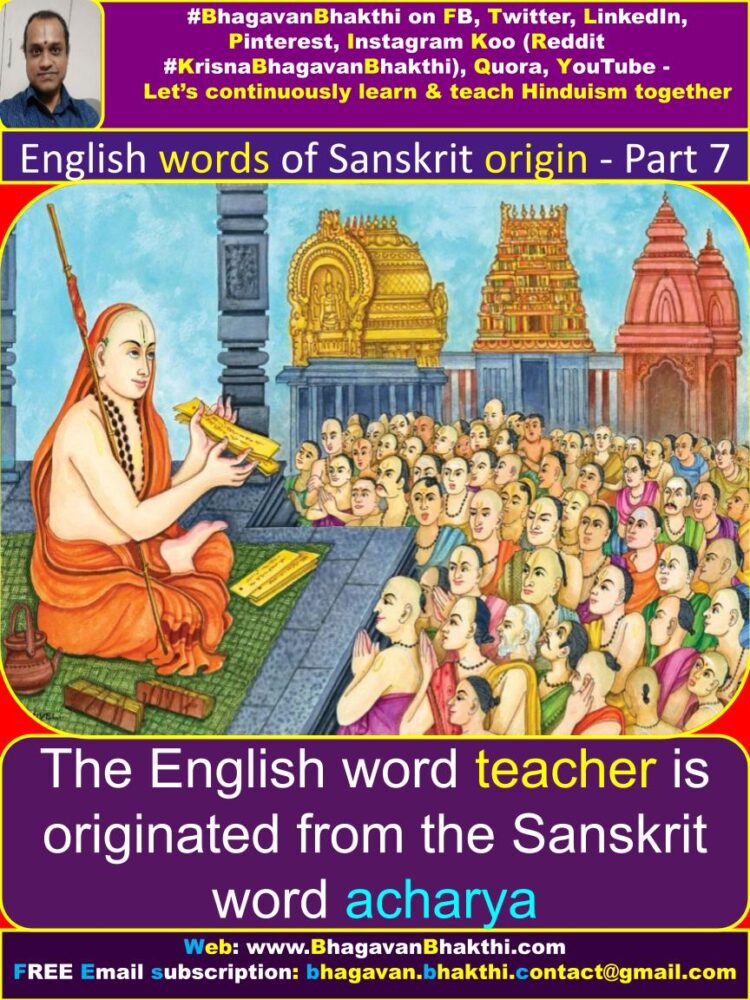
Ignatius : Ignatius is a male name of presumed Latin or Etruscan origin, believed to mean “fiery one” (compare the word “ignite”). Here the point to be noted is that the name “Ignatius” means something which is related to fire. In Sanskrit “agni’ means fire. Very clearly the European word is directly taken from the Sanskrit word.
Nomenclature : This is pure Sanskrit word, but mispronounced from the Sanskrit words “naamakarana” (naamakarna). Fist : This word has been mispronounced from the Sanskrit word ‘mushti’. You can clearly see the second of both the words are similar.
Tactic : This word is directly taken from the Sanksrit word ‘tantra’. Both have same meaning. Donning : This is another mispronounced words from Sanskrit. The original word for donning is ‘Dharana’ (pronounce it as dhaarana).
Plank : This is another mispronounced word from the Sanskrit language word ‘phalaka or phalak’. Work : This is taken from the Sanskrit word ‘writti‘ (वृत्ति). Pure : Pure word is taken from the Sanskrit word ‘pavitra‘.
Suitable : Taken from Sanksrit word ‘suktam / sukta / sukt’. Hail / Hello : This is derived from the Sanskrit word ‘hare krishna‘. Even today many people greet with this word in India.
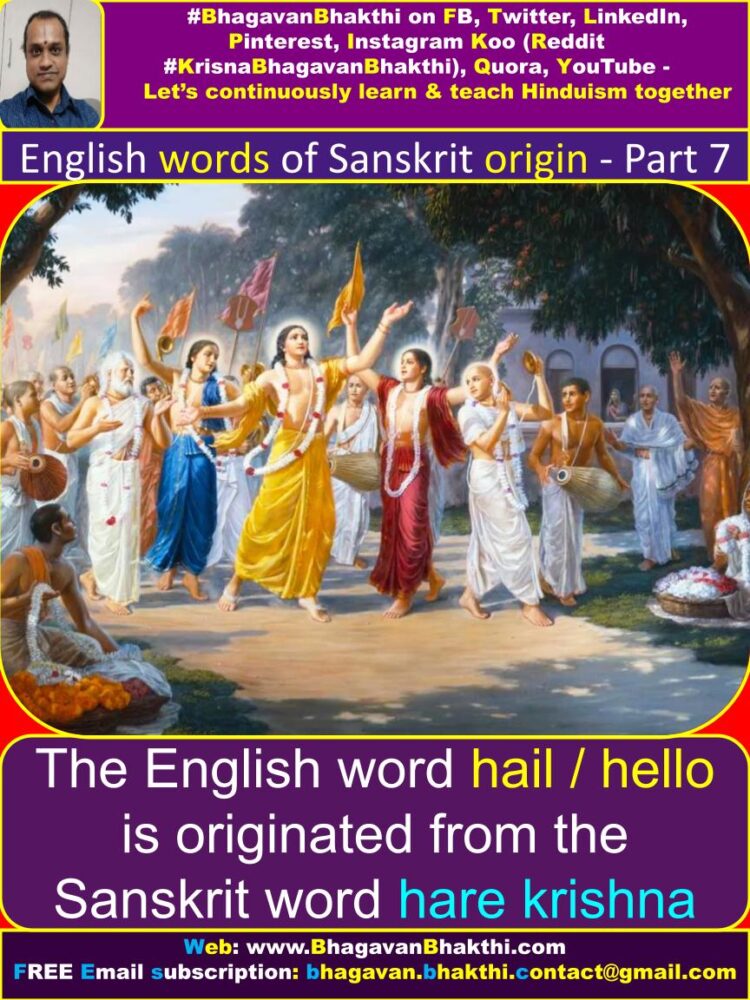
Prestige : This is taken from Sanksrit word ‘pratishta‘. Propaganda : This is from Sanskrit word ‘pracharam‘. Omnipresent : In Sanskrit ‘Om‘ means someone who is present everywhere, that is, Lord Sri Vishnu.
Also in Sanskrit ‘present’ means ‘prastuti‘. Very clearly the English word is taken from the Sanskrit.
Sustain : In Sanskrit sustaining meaning ‘sthiti‘. Moral : In Sanskrit moral means ‘moulya‘.
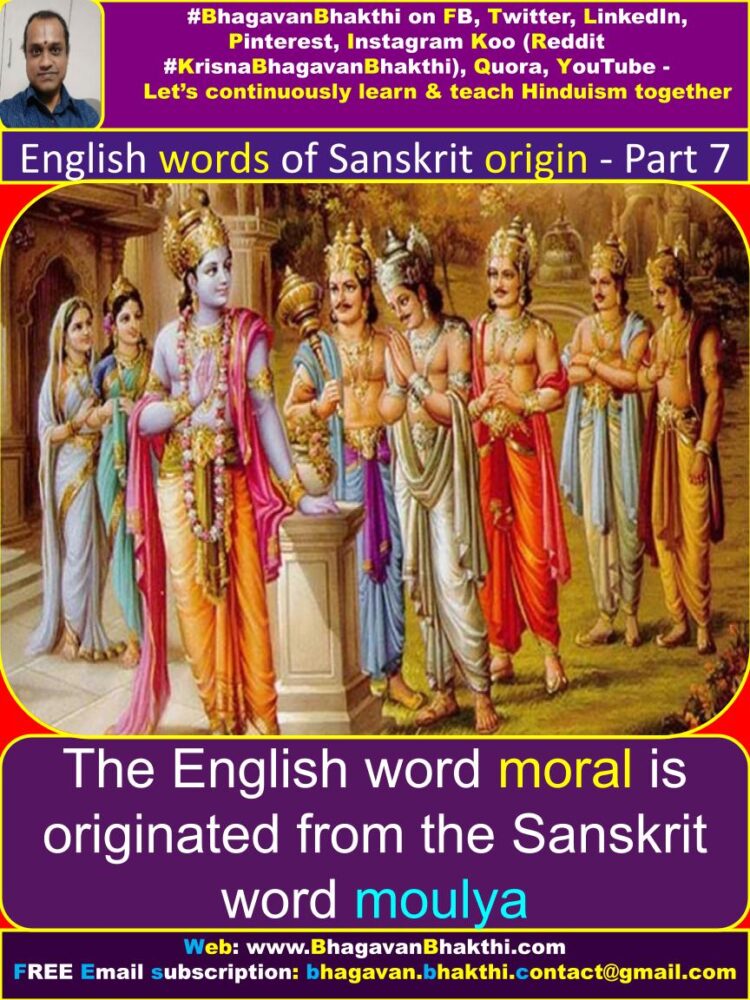
Grasping (Grasp) : In Sanskrit Grasping (Grasp) means Grahanam (ग्रहणं) (grahaṇaṁ). Gargle : The original Sanskrit word for gargle is ‘gandusha (गण्डूष) (gaṇḍūṣa)’. Pure : This English word ‘pure’ originated from the Sanskrit word ‘pUta’ (pūta). In Sanskrit pUta means pure.
Sugar-candy (Sugarcane) : In Sanskrit Khandava (Khandav) means sugar-candy. The second part of this word, that is, candy (cane) is taken from Khandav and Sugar is taken from Sakkara of the Sanskrit language.
Remember the Khandavaprastha (Khandavprasth) place during the Mahabharata period. During that period a lot of sugarcanes were grown in this place and thus the name Khandavprasth.
More information will be added to this on regular basis. Please visit this post and this blog / website to get the updated information.
To watch videos on #Hinduism #Sanskrit language, SUBSCRIBE to my YouTube channel from this below link:
#BhagavanBhakthi YouTube channel
Continue reading to know about “List of English words originated from Sanskrit” from these below links:
List of English words of Sanskrit origin – Part 1 of Part 7
List of English words of Sanskrit origin – Part 2 of Part 7
List of English words of Sanskrit origin – Part 3 of Part 7
List of English words of Sanskrit origin – Part 4 of Part 7
List of English words of Sanskrit origin – Part 5 of Part 7
List of English words of Sanskrit origin – Part 6 of Part 7
Dear friends, if you need any clarifications about this post, kindly let me know, I will definitely try to answer all of them.
Also your one LIKE, one COMMENT, One Share, one SUBSCRIPTION is highly important.
This will help to know the quality of this content and also it will be helpful to know if any improvements is required for the content.
If you feel this content is useful to you and has helped you to improve your knowledge, kindly share this with your well-wishers.
Because “SHARING MEANS CARING”.
For receive FREE EMAIL SUBSCRIPTION about #BhagavanBhakthi, you can send an email to [email protected] from your email ID.
NAMASTE!
Sri Gurubhyo namaha
Om Sri Krishnaaya namaha
Sri Krishnaarpanamastu
Share in Social Media